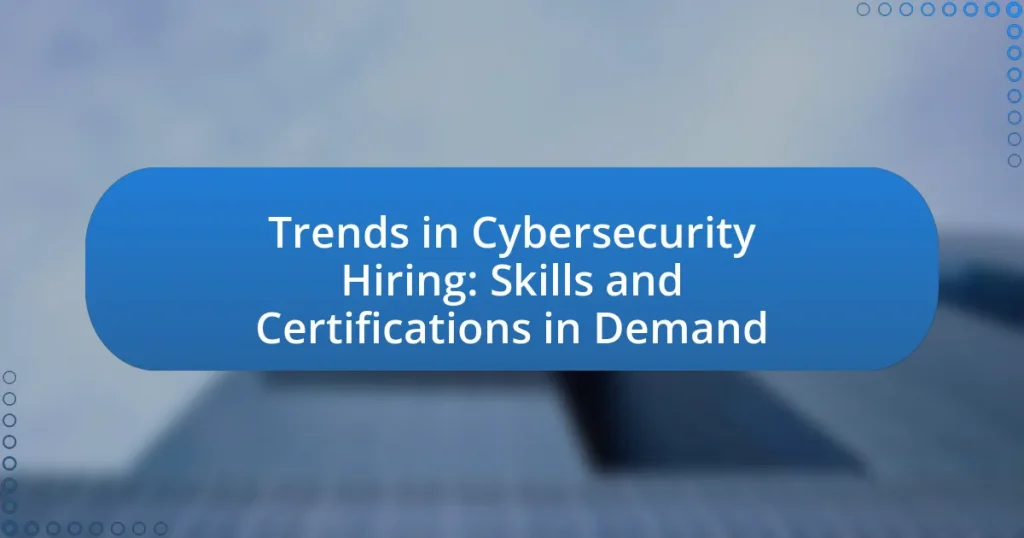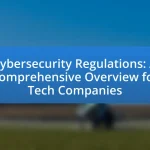The article focuses on current trends in cybersecurity hiring, highlighting the increasing demand for professionals skilled in cloud security, threat intelligence, and incident response. With a projected global workforce gap of 3.5 million cybersecurity positions by 2025, employers are prioritizing candidates with certifications such as CISSP and CEH. The article discusses the factors driving this demand, including the rise in cyber threats and the impact of economic conditions, while also detailing the most sought-after roles, essential skills, and educational pathways for aspiring cybersecurity professionals. Additionally, it emphasizes the importance of practical experience and networking in enhancing job prospects within the field.
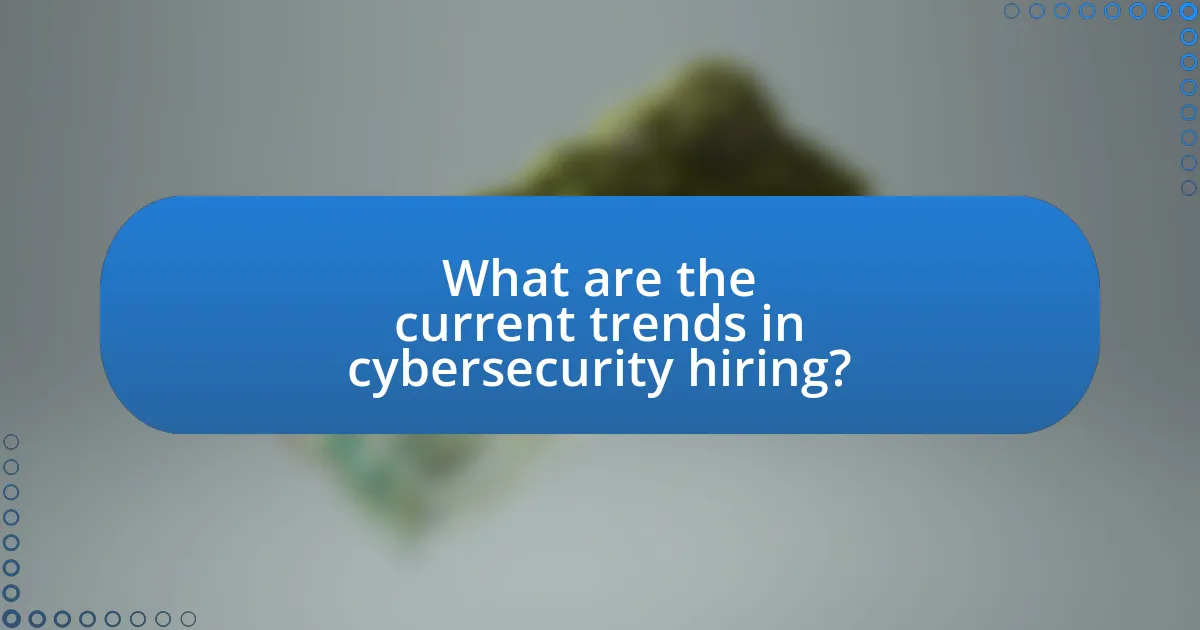
What are the current trends in cybersecurity hiring?
Current trends in cybersecurity hiring indicate a significant demand for professionals with expertise in cloud security, threat intelligence, and incident response. According to a 2023 report by Cybersecurity Ventures, the global cybersecurity workforce gap is projected to reach 3.5 million unfilled positions by 2025, highlighting the urgent need for skilled individuals in this field. Additionally, employers are increasingly prioritizing candidates with certifications such as Certified Information Systems Security Professional (CISSP) and Certified Ethical Hacker (CEH), as these credentials demonstrate a validated skill set essential for addressing evolving cyber threats.
How has the demand for cybersecurity professionals changed recently?
The demand for cybersecurity professionals has significantly increased recently, driven by the rise in cyber threats and data breaches. According to the Cybersecurity Workforce Study by (ISC)², the global cybersecurity workforce needs to grow by 65% to effectively defend organizations against increasing cyber risks. Additionally, the U.S. Bureau of Labor Statistics projects a 31% growth in employment for information security analysts from 2019 to 2029, much faster than the average for all occupations. This surge in demand highlights the critical need for skilled cybersecurity professionals in various sectors.
What factors are driving the increased demand for cybersecurity roles?
The increased demand for cybersecurity roles is primarily driven by the rising frequency and sophistication of cyberattacks. Organizations are increasingly recognizing the critical need to protect sensitive data and maintain compliance with regulations, leading to a surge in hiring cybersecurity professionals. According to Cybersecurity Ventures, global cybercrime costs are projected to reach $10.5 trillion annually by 2025, highlighting the urgent need for skilled personnel to combat these threats. Additionally, the shift to remote work and the expansion of digital services during the COVID-19 pandemic have further amplified vulnerabilities, necessitating a stronger cybersecurity workforce to safeguard against potential breaches.
How do economic conditions influence cybersecurity hiring trends?
Economic conditions significantly influence cybersecurity hiring trends by affecting the demand for skilled professionals in the field. During economic downturns, organizations often reduce their budgets, leading to fewer job openings and a focus on retaining existing staff rather than hiring new talent. Conversely, in a robust economy, companies tend to invest more in cybersecurity, resulting in increased hiring to address growing threats and compliance requirements. For instance, a report from Cybersecurity Ventures predicts that there will be 3.5 million unfilled cybersecurity jobs globally by 2025, driven by the rising need for security measures in an expanding digital landscape. This trend highlights how economic factors directly correlate with the availability of cybersecurity positions and the urgency for skilled workers.
What types of roles are most sought after in cybersecurity?
The most sought-after roles in cybersecurity include Security Analysts, Security Engineers, and Incident Responders. Security Analysts are essential for monitoring and analyzing security incidents, with a projected job growth of 31% from 2019 to 2029 according to the U.S. Bureau of Labor Statistics. Security Engineers design and implement security systems, while Incident Responders manage and mitigate security breaches, both roles experiencing high demand due to increasing cyber threats. Additionally, roles such as Penetration Testers and Chief Information Security Officers (CISOs) are also in high demand, reflecting the need for advanced skills and strategic leadership in cybersecurity.
Which entry-level positions are gaining popularity in the cybersecurity field?
Entry-level positions gaining popularity in the cybersecurity field include Security Analyst, Incident Responder, and Security Consultant. The demand for Security Analysts has surged due to the increasing number of cyber threats, with a projected growth rate of 31% from 2019 to 2029 according to the U.S. Bureau of Labor Statistics. Incident Responders are also in high demand as organizations seek to quickly address and mitigate security breaches. Additionally, Security Consultants are becoming essential as businesses require expert guidance on security measures and compliance. These roles reflect the growing emphasis on proactive cybersecurity measures in response to evolving threats.
What advanced roles are emerging in cybersecurity hiring trends?
Advanced roles emerging in cybersecurity hiring trends include Security Architects, Cloud Security Specialists, and Incident Response Managers. Security Architects design robust security systems and frameworks, addressing the increasing complexity of cyber threats. Cloud Security Specialists focus on securing cloud environments, reflecting the shift towards cloud computing in organizations. Incident Response Managers coordinate responses to security breaches, emphasizing the need for rapid and effective incident management. These roles are driven by the growing sophistication of cyber threats and the demand for specialized skills in protecting digital assets.
What industries are experiencing the highest demand for cybersecurity talent?
The industries experiencing the highest demand for cybersecurity talent include finance, healthcare, government, and technology. The finance sector requires robust cybersecurity measures due to the sensitive nature of financial data and regulatory compliance, leading to a significant need for skilled professionals. In healthcare, the increasing digitization of patient records and the rise in cyber threats necessitate strong cybersecurity expertise to protect sensitive health information. Government agencies prioritize cybersecurity to safeguard national security and critical infrastructure, resulting in a high demand for talent in this area. The technology industry, driven by rapid innovation and the proliferation of digital services, also faces a constant need for cybersecurity professionals to address emerging threats and vulnerabilities. According to the Cybersecurity Workforce Study by (ISC)², there is a projected shortage of 3.4 million cybersecurity professionals globally, highlighting the urgent need across these key industries.
How does the healthcare sector impact cybersecurity hiring trends?
The healthcare sector significantly influences cybersecurity hiring trends by increasing demand for specialized cybersecurity professionals. This demand arises from the sector’s heightened vulnerability to cyberattacks, as evidenced by a 2021 report from the Cybersecurity and Infrastructure Security Agency, which indicated that healthcare organizations faced a 50% increase in ransomware attacks compared to previous years. Consequently, healthcare institutions are prioritizing the recruitment of cybersecurity experts with skills in risk management, compliance with regulations like HIPAA, and knowledge of healthcare-specific threats. This trend is further supported by the growing emphasis on securing electronic health records and telehealth services, leading to a surge in job postings for cybersecurity roles within the healthcare industry.
What role does the financial industry play in cybersecurity job growth?
The financial industry significantly drives cybersecurity job growth due to its high regulatory requirements and the increasing frequency of cyber threats. Financial institutions, such as banks and investment firms, are prime targets for cyberattacks, necessitating robust cybersecurity measures. According to a report by Cybersecurity Ventures, the global cybersecurity workforce gap is projected to reach 3.5 million unfilled positions by 2025, with the financial sector being one of the largest employers of cybersecurity professionals. This demand is fueled by the need for compliance with regulations like the Gramm-Leach-Bliley Act and the Payment Card Industry Data Security Standard, which require stringent data protection protocols. Consequently, the financial industry’s focus on safeguarding sensitive information and maintaining customer trust directly contributes to the expansion of cybersecurity job opportunities.
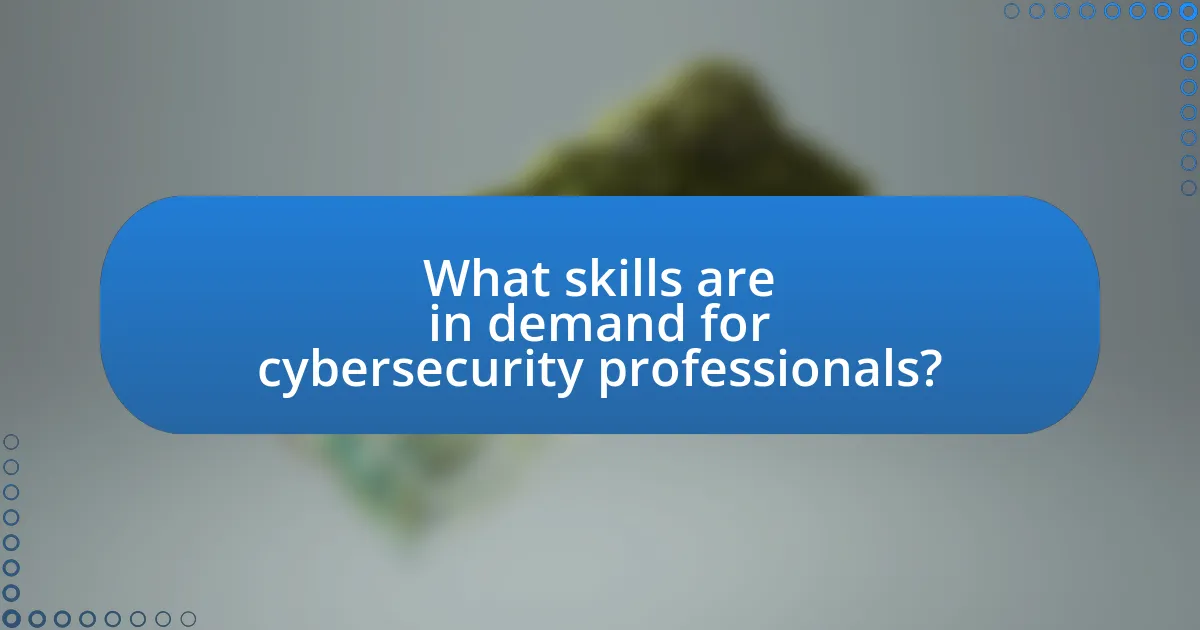
What skills are in demand for cybersecurity professionals?
Skills in demand for cybersecurity professionals include proficiency in network security, risk assessment, incident response, and knowledge of security frameworks such as NIST and ISO 27001. These skills are critical as organizations face increasing cyber threats; for instance, the Cybersecurity Workforce Study by (ISC)² indicates a global shortage of 3.4 million cybersecurity professionals, highlighting the urgent need for skilled individuals in this field. Additionally, familiarity with programming languages like Python and understanding of cloud security are increasingly sought after, as businesses migrate to cloud environments and require robust security measures.
Which technical skills are most sought after in cybersecurity hiring?
The most sought-after technical skills in cybersecurity hiring include proficiency in network security, knowledge of security information and event management (SIEM) tools, expertise in penetration testing, and familiarity with cloud security. These skills are critical as organizations increasingly face sophisticated cyber threats. For instance, a report by (ISC)² in 2021 highlighted that 70% of cybersecurity professionals identified network security as a top skill needed, while 60% emphasized the importance of SIEM tools for threat detection and response. Additionally, the demand for cloud security expertise has surged due to the widespread adoption of cloud services, with a 2022 Cybersecurity Workforce Study indicating a 30% increase in job postings requiring cloud security skills.
What programming languages should cybersecurity professionals know?
Cybersecurity professionals should know programming languages such as Python, JavaScript, C, and SQL. Python is widely used for scripting and automation in security tasks, while JavaScript is essential for understanding web vulnerabilities. C is important for low-level programming and understanding system vulnerabilities, and SQL is crucial for database security and managing data breaches. These languages are integral to various cybersecurity roles, as they enable professionals to develop security tools, analyze threats, and understand the underlying code of applications and systems.
How important are cloud security skills in today’s job market?
Cloud security skills are critically important in today’s job market. As organizations increasingly migrate to cloud environments, the demand for professionals who can secure these infrastructures has surged. According to a report by Cybersecurity Ventures, the global cybersecurity workforce gap is projected to reach 3.5 million unfilled positions by 2025, highlighting the urgent need for skilled individuals in this area. Furthermore, a survey by (ISC)² indicates that 30% of cybersecurity professionals believe cloud security skills are among the top three most sought-after skills in the industry. This trend underscores the essential role that cloud security expertise plays in safeguarding sensitive data and maintaining compliance in an evolving digital landscape.
What soft skills are essential for success in cybersecurity roles?
Effective communication is an essential soft skill for success in cybersecurity roles. Cybersecurity professionals must convey complex technical information clearly to non-technical stakeholders, ensuring that security policies and risks are understood across the organization. Additionally, problem-solving skills are crucial, as cybersecurity experts often face unexpected challenges that require quick and effective solutions. Teamwork is also vital, as collaboration with various departments enhances the overall security posture of the organization. Adaptability is important in the rapidly evolving cybersecurity landscape, where new threats emerge frequently, necessitating continuous learning and adjustment of strategies. These soft skills collectively contribute to a cybersecurity professional’s ability to navigate their role effectively and respond to the dynamic nature of cyber threats.
Why is communication important for cybersecurity professionals?
Communication is crucial for cybersecurity professionals because it enables effective collaboration, information sharing, and incident response. Clear communication ensures that team members understand security protocols, threats, and vulnerabilities, which is essential for maintaining a secure environment. According to a study by the Ponemon Institute, organizations with strong communication practices experience 50% fewer security incidents. This statistic highlights the direct correlation between effective communication and enhanced cybersecurity outcomes, emphasizing its importance in the field.
How do problem-solving skills contribute to cybersecurity effectiveness?
Problem-solving skills significantly enhance cybersecurity effectiveness by enabling professionals to identify, analyze, and mitigate threats efficiently. These skills allow cybersecurity experts to approach complex security challenges systematically, leading to quicker detection of vulnerabilities and more effective incident response. For instance, a study by the Ponemon Institute found that organizations with strong problem-solving capabilities reduced their average breach response time by 30%. This demonstrates that adept problem solvers can not only address immediate security issues but also implement long-term strategies to prevent future incidents, thereby improving overall organizational security posture.
What certifications are highly valued in the cybersecurity job market?
The certifications highly valued in the cybersecurity job market include Certified Information Systems Security Professional (CISSP), Certified Ethical Hacker (CEH), and CompTIA Security+. These certifications are recognized globally and demonstrate a professional’s expertise in various aspects of cybersecurity. For instance, CISSP is often regarded as a gold standard for information security professionals, with over 140,000 certified individuals worldwide, indicating its strong market demand. CEH focuses on ethical hacking skills, which are increasingly sought after as organizations prioritize proactive security measures. CompTIA Security+ serves as an entry-level certification that validates foundational security skills, making it a popular choice for those starting their careers in cybersecurity.
Which entry-level certifications should aspiring cybersecurity professionals pursue?
Aspiring cybersecurity professionals should pursue entry-level certifications such as CompTIA Security+, Certified Ethical Hacker (CEH), and Cisco’s CCNA Cyber Ops. CompTIA Security+ is widely recognized and covers essential security concepts, making it a foundational certification for beginners. The Certified Ethical Hacker (CEH) certification provides knowledge on penetration testing and ethical hacking, which are critical skills in the cybersecurity field. Cisco’s CCNA Cyber Ops focuses on security operations and incident response, equipping candidates with practical skills needed in security operations centers. These certifications are validated by industry demand, as they are frequently listed in job postings for entry-level cybersecurity positions, indicating their relevance and importance in the hiring process.
What advanced certifications can enhance a cybersecurity career?
Advanced certifications that can enhance a cybersecurity career include Certified Information Systems Security Professional (CISSP), Certified Ethical Hacker (CEH), and Certified Information Security Manager (CISM). These certifications are recognized globally and validate expertise in various cybersecurity domains. For instance, CISSP is often regarded as a gold standard in the industry, demonstrating a professional’s ability to manage and lead security teams, while CEH focuses on ethical hacking techniques to identify vulnerabilities. CISM emphasizes management and governance, making it ideal for those looking to advance into leadership roles. The demand for these certifications is supported by industry reports indicating that professionals with such credentials often command higher salaries and have better job prospects.
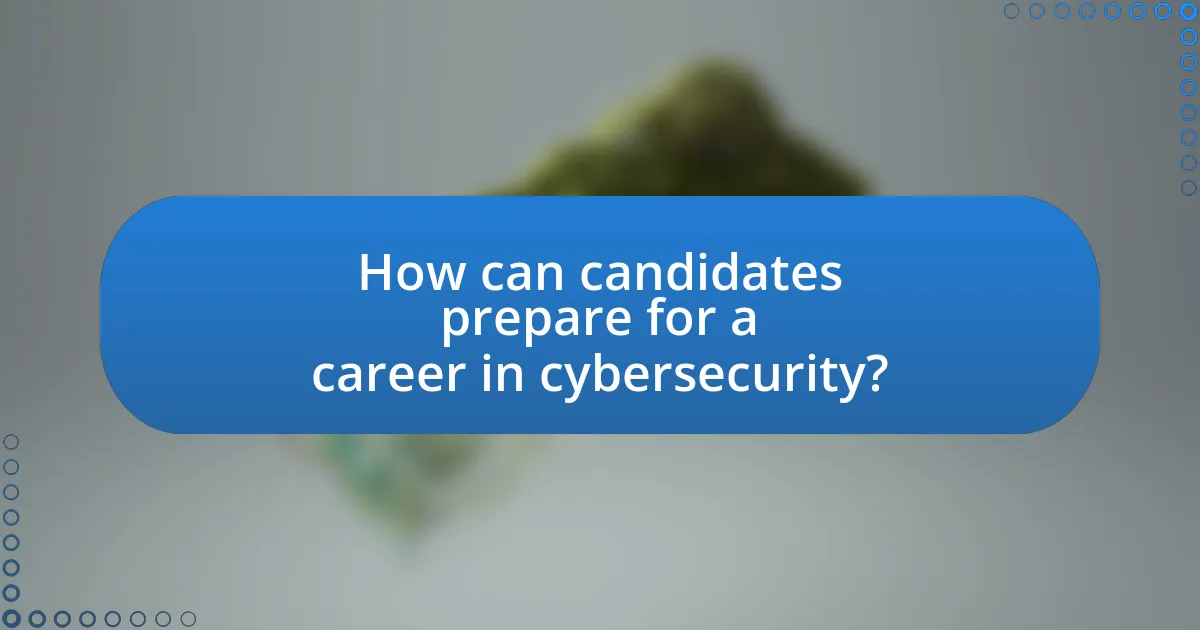
How can candidates prepare for a career in cybersecurity?
Candidates can prepare for a career in cybersecurity by obtaining relevant certifications, gaining practical experience, and developing a strong understanding of security principles. Certifications such as CompTIA Security+, Certified Information Systems Security Professional (CISSP), and Certified Ethical Hacker (CEH) are highly regarded in the industry and validate a candidate’s knowledge and skills. Practical experience can be gained through internships, lab environments, or participation in cybersecurity competitions, which help candidates apply theoretical knowledge in real-world scenarios. Additionally, understanding key concepts such as risk management, network security, and incident response is essential, as these areas are frequently emphasized in job descriptions and hiring trends. According to the 2023 Cybersecurity Workforce Study by (ISC)², there is a significant demand for professionals with these skills, highlighting the importance of targeted preparation for candidates entering the field.
What educational pathways are available for aspiring cybersecurity professionals?
Aspiring cybersecurity professionals can pursue various educational pathways, including formal degrees, certifications, and boot camps. A bachelor’s degree in cybersecurity, computer science, or information technology provides foundational knowledge and skills essential for the field. Additionally, industry-recognized certifications such as CompTIA Security+, Certified Information Systems Security Professional (CISSP), and Certified Ethical Hacker (CEH) validate expertise and enhance employability. Boot camps offer intensive, short-term training focused on practical skills, catering to those seeking quick entry into the workforce. According to the U.S. Bureau of Labor Statistics, employment in cybersecurity roles is projected to grow by 31% from 2019 to 2029, highlighting the increasing demand for qualified professionals in this area.
How do degree programs compare to bootcamps in cybersecurity training?
Degree programs in cybersecurity typically offer a more comprehensive and in-depth education compared to bootcamps, which focus on practical skills in a shorter timeframe. Degree programs usually span two to four years and cover a broad range of topics, including theory, policy, and advanced technical skills, while bootcamps often last a few weeks to a few months and emphasize hands-on training for specific job roles. According to a report by Burning Glass Technologies, 67% of cybersecurity job postings require a bachelor’s degree or higher, indicating that many employers prefer candidates with formal education. Additionally, degree programs often provide networking opportunities and access to internships, which can enhance job prospects, whereas bootcamps may lack these resources.
What role do online courses play in cybersecurity education?
Online courses play a crucial role in cybersecurity education by providing accessible, flexible, and up-to-date training for individuals seeking to enter or advance in the field. These courses often cover essential topics such as network security, ethical hacking, and risk management, aligning with industry demands for specific skills. According to a report by CyberSeek, there are over 500,000 unfilled cybersecurity jobs in the United States, highlighting the need for effective educational pathways. Online courses enable learners to acquire certifications like CompTIA Security+ or Certified Information Systems Security Professional (CISSP), which are highly regarded by employers. This accessibility and alignment with industry standards make online courses a vital component of modern cybersecurity education.
What practical experience is beneficial for cybersecurity job seekers?
Practical experience beneficial for cybersecurity job seekers includes hands-on experience with security tools, participation in internships, and involvement in cybersecurity competitions. Engaging with security tools such as firewalls, intrusion detection systems, and vulnerability scanners allows candidates to understand real-world applications of cybersecurity principles. Internships provide exposure to professional environments and the opportunity to work on actual security incidents, enhancing problem-solving skills. Additionally, participating in competitions like Capture the Flag (CTF) events fosters critical thinking and technical skills, as these events simulate real-world cybersecurity challenges. According to a 2022 survey by CyberSeek, 70% of employers prefer candidates with practical experience, highlighting its importance in the hiring process.
How can internships enhance a candidate’s cybersecurity profile?
Internships enhance a candidate’s cybersecurity profile by providing practical experience and exposure to real-world security challenges. This hands-on experience allows candidates to apply theoretical knowledge, develop technical skills, and understand industry best practices. According to a study by the National Association of Colleges and Employers, 60% of employers prefer candidates with internship experience, highlighting the value of internships in making candidates more competitive in the job market. Additionally, internships often facilitate networking opportunities, enabling candidates to connect with industry professionals and gain insights into current trends and demands in cybersecurity.
What projects can candidates undertake to demonstrate their skills?
Candidates can undertake projects such as developing a personal cybersecurity tool, conducting a security audit for a small business, or creating a comprehensive incident response plan to demonstrate their skills. These projects showcase practical application of knowledge in real-world scenarios, highlighting abilities in threat detection, risk assessment, and incident management. For instance, developing a personal cybersecurity tool can illustrate programming skills and understanding of vulnerabilities, while conducting a security audit can demonstrate analytical skills and knowledge of compliance standards. Creating an incident response plan reflects strategic thinking and preparedness for potential security breaches.
What tips can help candidates stand out in the cybersecurity job market?
Candidates can stand out in the cybersecurity job market by obtaining relevant certifications, gaining practical experience, and developing specialized skills. Certifications such as Certified Information Systems Security Professional (CISSP) and Certified Ethical Hacker (CEH) are highly regarded and demonstrate a candidate’s commitment and expertise. Practical experience, whether through internships, labs, or personal projects, showcases hands-on skills that employers value. Additionally, focusing on specialized areas like cloud security or incident response can differentiate candidates, as these skills are increasingly in demand due to the evolving threat landscape. According to the 2023 Cybersecurity Workforce Study by (ISC)², there is a significant skills gap in the industry, highlighting the importance of these qualifications for job seekers.
How important is networking for cybersecurity job seekers?
Networking is crucial for cybersecurity job seekers as it significantly enhances their chances of securing employment in a competitive field. Research indicates that approximately 70% of job openings are not publicly advertised, making personal connections vital for accessing hidden opportunities. Additionally, networking allows job seekers to gain insights into industry trends, learn about potential employers, and receive referrals, which can lead to higher chances of landing interviews. Therefore, effective networking is an essential strategy for those pursuing careers in cybersecurity.
What strategies can candidates use to improve their resumes for cybersecurity roles?
Candidates can improve their resumes for cybersecurity roles by tailoring their skills and experiences to match job descriptions, emphasizing relevant certifications, and showcasing practical experience. Tailoring involves aligning keywords from job postings with the candidate’s skills, which increases the chances of passing through Applicant Tracking Systems (ATS). Relevant certifications, such as Certified Information Systems Security Professional (CISSP) or CompTIA Security+, demonstrate a commitment to the field and validate expertise. Additionally, showcasing practical experience through internships, projects, or contributions to open-source security tools highlights hands-on skills, which are critical in cybersecurity. According to a 2022 report by CyberSeek, 70% of cybersecurity job postings require specific certifications, underscoring their importance in the hiring process.
